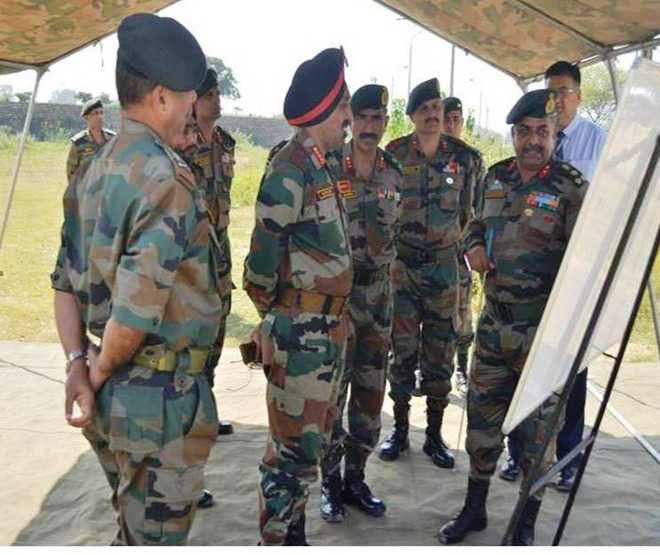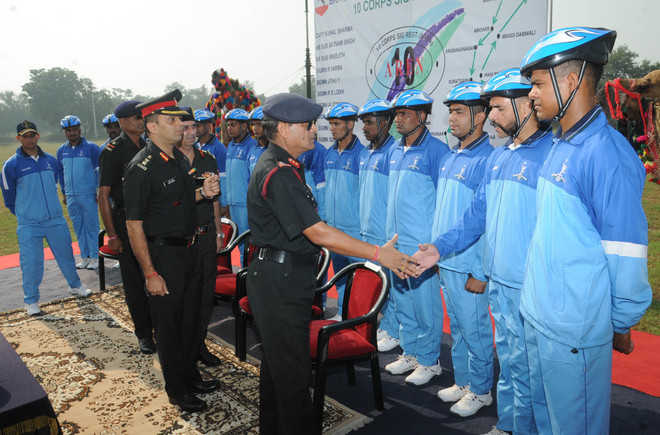New Delhi is warming up to the UAE at a time when Islamabad has earned the wrath of many Arab states, especially the Emirates
When Narendra Modi visited Abu Dhabi and Dubai last summer, the Pakistani daily Dawn wondered if the Indian prime minister had “stepped into the recent breach between Pakistan and the United Arab Emirates over Islamabad’s refusal to actively join the Yemen war?” The need for the question-mark was removed this week, with the announcement that Abu Dhabi’s crown prince, Mohamed bin Zayed al Nahyan, will be the guest of honour at India’s next Republic Day celebrations
 REUTERSCrown Prince of Abu Dhabi Sheikh Mohamed bin Zayed al Nahyan waves to Prime Minister Narendra Modi at Rashtrapati Bhavan, February 11
REUTERSCrown Prince of Abu Dhabi Sheikh Mohamed bin Zayed al Nahyan waves to Prime Minister Narendra Modi at Rashtrapati Bhavan, February 11
There are plenty of reasons for Modi to make Sheikh Mohamed his chief guest, not least the $60 billion in IndoUAE trade, and the 2.3 million Indians who live and work in the Emirates. But the timing of the announcement made it especially piquant for Pakistan, for it came in the middle of New Delhi’s campaign to isolate Islamabad diplomatically in the aftermath of the Uri attacks.
Islamabad should have seen this coming. On his August, 2015 trip to the UAE, Modi made pointed barbs at Islamabad during his public speeches, eliciting no reproach from his hosts. Earlier that year, Pakistan had earned the wrath of several Arab states, including the UAE, when it refused to join a coalition led by Saudi Arabia in an assault on Yemen, where Iran-backed Shia militias known as the Houthis had toppled a Saudi-friendly government. The UAE was especially blunt in its expression of displeasure. Minister of state for foreign affairs Anwar Mohammed Gargash rounded on Islamabad for its “vague and contradictory stand”, and warned Pakistan would pay a “heavy price”.
In the language of diplomatic politesse, such words are the equivalent of schoolyard curses, but Gargash had even harsher invective to deliver. He suggested Islamabad cared more for Iran than for the Arab states: This, in the context of the Sunni-Shia conflagration across West Asia, came within a whisker of accusing Pakistan of apostasy, a heinous and contemptible crime in Islam.
Pakistan was right to stay out of the war on Yemen, which continues to this day, bringing ever more destruction to the Arab world’s poorest nation and still more dishonour to its richest. Although Islamabad does little to discourage the persecution of the Shia (and other minorities) within Pakistan, it cannot, for many reasons, afford to participate in the wider sectarian conflict. Having long been assured that their military was busy protecting them from the designs of India, and the depredations of internal enemies, like Baloch separatists and Pashtun terrorists, ordinary Pakistanis showed no interest in sending their troops to fight for a dubious Arab cause.
Even so, saying “No” can’t have been easy for Prime Minister Nawaz Sharif, or for army chief Raheel Sharif. The Arab states are Pakistan’s principal economic benefactors, as well as a diplomatic bulwark against India. The UAE is one of Pakistan’s largest donors of aid, both humanitarian and economic, and its largest trade partner. Around 1.8 million Pakistanis live in the Emirates. The Arab states also bankroll Raheel’s troops, and helped underwrite Islamabad’s nuclear programme. In return, they have long regarded the Pakistani military as theirs to summon.
It is hard to know if the Pakistani military would have swung the conflict in Yemen decisively in favour of the Saudi coalition, which has proved singularly incompetent, despite overwhelming superiority in arms. Earlier this summer, Gargash announced the UAE was pulling most of its forces out of Yemen, citing the death of 80 of its soldiers — a large number for such a small country. (The war continues to exact a toll, however: Over the weekend, a UAE vessel was sunk by Yemeni rebels. They claim it was a warship, the UAE says it was delivering aid, and the US says it belonged to a dredging company.) For a nation that takes pride in its ability to buy the world’s best war weaponry to be forced into a withdrawal by a rag-tag band of rebels was an utter humiliation, and many Emiratis must wonder if they may have been spared the ignominy if Pakistan had joined the fight.
Since Gargash’s outburst last year, Islamabad has tried desperately to make nice with the Arab states, and especially with the UAE. But its efforts have mostly been in the shape of words, including a speech from Nawaz Sharif to the effect that Pakistan “does not abandon friends and strategic partners”. This has gone down like a lead balloon in the Emirates. On a trip the Dubai earlier this year, practically everyone I met were still asking why Pakistan was sitting out on the war.
Unable to do anything substantive to mend relations, the Pakistani leadership will have squirmed at Modi’s announcement of a “strategic partnership” between India and the UAE during his visit. Their discomfiture will have been the more acute for hearing that the India-UAE joint statement called “on all states to reject and abandon the use of terrorism against other countries, dismantle terrorism infrastructures where they exist, and bring perpetrators of terrorism to justice”. Subtle, it was not. With Sheikh Mohamed’s participation in India’s Republic Day now confirmed, there’s additional pressure on Pakistan’s leaders — political and military alike — to get back into the UAE’s good books. There’s little prospect that the Pakistani military will be deployed in Yemen, and even if that were to happen it would earn Islamabad few brownie points with the Emiratis, since they’ve themselves all but abandoned the battlefield. Nor are there any meaningful economic inducements that Pakistan can offer in recompense: The UAE already enjoys unrestricted access to the Pakistani market.

It’s a good thing that Pakistan’s leadership has had much recent practice in squirming uncomfortably. They will be doing a lot of it on January 26.


































































